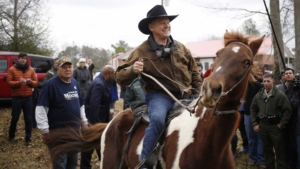
In a fairly major political upset Democrat Doug Jones defeated the Republican theocrat Roy Moore in the Alabama senate special election to fill the seat formerly held by Jeff Sessions, the current Attorney General. Alabama is a deeply conservative state that hasn’t elected a Democrat to statewide office in decades.
The election appeared to be a safe one for Republicans, but fell victim to both the internal politics of the Republican Party and the political mobilization of the–heavily working class–Black community. In the context of what appeared to be a race the Republicans could not lose, the various factions of the hard right and the ultra-right vied for the nomination to succeed Sessions. In the face of extreme reaction Black voters used their numerical advantage to exploit weaknesses in the Republican camp and deliver a victory for Democrats.
Rightwing collapses under the weight of its own reaction
Ultimately Judge Roy Moore became the Republican candidate. Moore, who was twice removed from his position on the Alabama State Supreme Court for violating the law is a longtime popular figure among the far right in Alabama. His entrance into the race shook things up as he bested even the other hard right candidate Congressman Mo Brooks to emerge as the “anti-establishment” Republican. Moore was even able to be victorious over the Trump-endorsed Luther Strange, who briefly served as the appointed Senator following Sessions’ ascension to the Justice Department.
Moore was able to represent himself as the most “unbought” of the Republican candidates, most likely to disrupt the cozy system of capitalist back scratching that is the Congress. He also was able to convince voters that he would be the most likely to push a reactionary cultural agenda and fight against immigrants and “crime.” Many white Alabamians of all classes view these as the causes of the devastation wrought by capitalist economic policies on traditional industries and the attached social/cultural way of life that went along with a particular class stratification in the Post WWII period.
In short, Moore was the candidate who best represented the anger stemming from the collapse of a
racially stratified class structure that used physical difference to parcel out relative levels of privilege.
As a result of this Moore, however, was a live grenade from the beginning. He has a range of controversial beliefs. First among them, he believes that Christian religious beliefs are the source of all governance in the U.S., not the Constitution, and thus the rule of law should yield at all times to biblical law–or rather his very conservative interpretation of it.
Moore has said that “homosexual behavior” is “a crime against nature,” an “inherent evil,” and “an act so heinous it defies one’s ability to describe it.” In 2014 he also suggested that public prayers not be allowed by anyone who is not Christian and that Islam is a “false religion.” At his final campaign rally he referred to Indigenous people and Asians as the “reds and yellows.” He also, for the record, randomly pulled out a gun on stage at that rally to counter charges that he was weak on gun rights.
So, just right there, it was clear Democrats had at least a chance. Then, it turned out that Roy Moore sexually preyed on teenage girls when he was in his 30s. A number of women came forward with allegations that Roy Moore had sexually assaulted them, and numerous anecdotal stories emerged which lent significant credence to the charges.
Moore was not able to convincingly rebut any of the charges, principally because he admitted to “dating” teenage girls while in his 30s and even admitted knowing some of the girls, not to mention that his signature appeared in yearbooks and cards presented by women who came forward.
On top of all of this Roy Moore said that the best time for America, when it was once “great,” was during the period of chattel slavery.
Despite this Republicans stuck with him. Steve Bannon and the ultra-right movement known as the “alt-right” doubled down on Moore. They did everything possible to discredit his accusers. They felt Moore was the second coming of Trump; his election would be part of their overall plan for a “season of war” against the Republican establishment which they see as led by Mitch McConnell who they claim wants to stop Trump’s agenda. The Republican National Committee also helped Moore out, although Senate Republicans and their campaign arms mainly steered clear.
This is a reflection of the ongoing battle within the Republican Party. Trump has adapted to the extreme free market views of the mainstream Republican Party which as as its only mission to maximize profit no matter the cost. The ultra-right faction is more concerned with the cultural underpinnings that U.S,–and to a degree Western–capitalism emerged from, which they see as crucial to the maintenance of the American imperialist project.
They are willing to trade some elements of free market orthodoxy to court workers, in exchange for a politics of racial purity and religious fundamentalism.
Democrats able to exploit Republican weakness
Doug Jones, for his part, recognized that to win he needed to mobilize the core base of the Democrats, working class Black people–particularly women–and that above average turnout would be necessary. He focused on key issues for the state like jobs and unemployment as well as access to healthcare through a Medicaid expansion and also refunding the Children’s Health Insurance Program. Alabama is one of the poorest states in the nation and its right wing leaders have gone out of their way to underfund what services do exist to help those whom capitalism has left behind.
Jones, then, gave voters reasons to vote for him, not just against Moore. The result was a big uptick in Black voter turnout that overcame significant efforts at voter suppression. Activists at the local level in
the Black belt counties, many without much support, knocked on hundreds of thousands of doors and made millions of phone calls.
Jefferson County, the site of Birmingham, saw 50,749 more votes than in the most recent comparable off-year Senate race. Montgomery County, home of the Montgomery Bus Boycott, saw 10,262 more voters turn out; Mobile County saw 17,785 more voters turn out than that comparable off-year election.
Some 20 percent of the voters were mothers and 66 percent of them voted for Doug Jones. While 35 percent of voters had children in the household, 56 percent of them voted for Jones. Almost certainly if you overlay that with race and income statistics you will see that the core of the core of Jones’ turnout was working class Black mothers and families.
It also appears that late breaking voters went more for Moore, which means Jones was probably in this race more than anyone ever thought and had had a real chance even before the sexual assault question became an issue for Moore. This is a clear reflection that Moore’s overall politics had sparked significant political mobilization from those who felt most endangered by his professed politics.
Serious potential in the South
This race shows there is real political potential in the South for progressive, even radical politics. The possibility to turn these areas in a more progressive direction hinges on speaking to, about and for
working class Black people, who if they turn out hold a serious numerical balance of power that is more formidable than often presented in mainstream depictions of the political climate there.
This election totally confirms why voter suppression is so essential to Republican strategies. Only by making the electorate skew whiter and older can they build governing consensus for their ideas, many of which are deeply unpopular when taken singularly. Further, they recognize that the Black working class community holds a strong balance of power and that if induced to mobilize could disrupt the hard right drift of the country which depends on a “solid South” of conservative votes (and has since the crushing of
Reconstruction and Populism in the 19th century.)
This presents both opportunities and challenges for the socialist movement in the United States. First, a challenge of helping to grow and nurture those already in these areas fighting for a world where people are more important than profit. Second, it presents a major challenge given that the Democrats clearly are not a political vehicle for liberatory politics, but are the center of political mobilization for the Black community with deep ties to the history of self-determining Black politics in the post-civil rights era.
The creation of plausible and serious institutions that can support independent political mobilization that uncompromisingly represent the interests of working and oppressed people is clearly a key task.
Obviously drawing too much from this election would not be prudent; it is just one event. It does however give us some serious food for thought, at least for those of us interested in how to move the country off the deep right wing track it is currently on and into a future free of exploitation.





